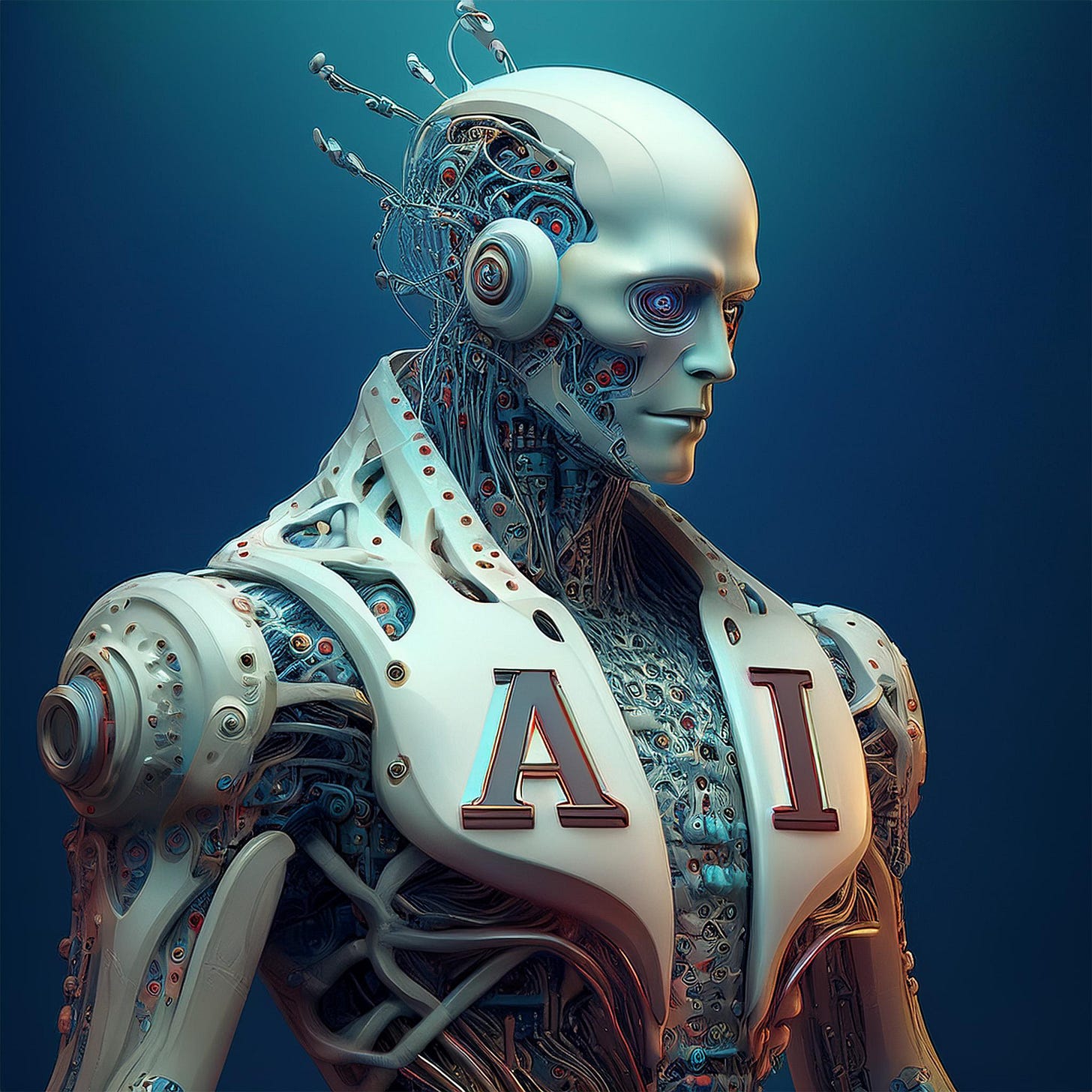AI Guy ©diane green 2024
The perception of AI as a monster stems from a combination of factors, including deep-seated anxieties about the unknown, concerns about job displacement, and the potential for misuse of the technology.
Humans have a natural tendency to fear the unknown, and AI, with its complex algorithms and rapid advancements, represents a significant departure from traditional forms of technology. This unfamiliarity can trigger a sense of unease and apprehension, leading some to view AI as a potential threat.
One of the primary drivers of this apprehension is the fear of job displacement. As AI technologies advance, they are increasingly capable of automating tasks previously performed by humans, leading to concerns about widespread unemployment and economic disruption. This fear is particularly pronounced in sectors such as manufacturing, transportation, and customer service, where AI-powered robots and chatbots are already beginning to replace human workers.
Another significant concern is the potential for AI to be misused or manipulated. The rapid development of AI technologies has outpaced our ability to fully understand and control them, raising concerns about unintended consequences and the potential for malicious actors to exploit AI for harmful purposes. This includes the use of AI to spread misinformation and propaganda, to develop autonomous weapons systems, and to invade individual privacy.
Furthermore, the lack of transparency and explainability in many AI systems contributes to a sense of distrust and unease. Many AI algorithms are complex and opaque, making it difficult for humans to understand how they arrive at their decisions. This lack of transparency can lead to concerns about fairness, accountability, and the potential for bias and discrimination to be embedded in AI systems.
The ethical implications of AI are also a source of concern for many people. As AI systems become increasingly sophisticated, they raise questions about the nature of consciousness, the meaning of human existence, and the ethical responsibilities that we have towards AI entities. These questions are complex and far-reaching, and they have the potential to challenge our fundamental understanding of ourselves and our place in the world.
The rapid pace of AI development can be overwhelming and disorienting for many people. The constant stream of news and information about AI can create a sense of anxiety and uncertainty about the future. This can be particularly true for those who feel that they are unable to keep up with the rapid pace of technological change, or who fear that they will be left behind in an increasingly automated world.
In light of these concerns, it is important to engage in a thoughtful and nuanced discussion about the potential benefits and risks of AI. While AI technologies offer the potential for significant progress in areas such as healthcare, education, and scientific research, it is crucial to address the challenges and concerns that they raise. This includes developing ethical guidelines for AI development and deployment, ensuring that AI systems are transparent and accountable, and mitigating the potential for job displacement and economic disruption.
To counter the negative perception of AI, it is important to emphasize the potential benefits of the technology. AI can be used to solve some of the world's most pressing challenges, such as climate change, poverty, and disease. It can also be used to improve our daily lives in countless ways, from personalized education to more efficient transportation. It is important to emphasize that AI is a tool created by humans and is ultimately under our control. We can use AI for good or evil, and it is up to us to ensure that it is used responsibly. We must also be mindful of the ethical implications of AI development and deployment.
It is also important to recognize that AI is not a monolithic entity, but rather a diverse set of technologies with varying levels of complexity and potential impact. Some AI applications, such as those used in spam filtering and fraud detection, are relatively simple and pose little risk. Others, such as those used in autonomous vehicles and medical diagnosis, are more complex and have the potential for significant impact.
AI Gal ©diane green 2024
In an effort to mitigate these concerns and foster a more positive dialogue around AI, it is crucial to emphasize the potential benefits that AI can offer. In healthcare, AI-powered tools can assist doctors in diagnosing diseases, developing personalized treatment plans, and accelerating drug discovery. In education, AI-powered tutoring systems can provide personalized learning experiences for students, while AI-powered grading systems can free up teachers to focus on more meaningful interactions with their students.
In transportation, AI-powered autonomous vehicles can improve road safety, reduce traffic congestion, and increase accessibility for people with disabilities. In entertainment, AI-powered recommendation systems can help us discover new music, movies, and books that we might enjoy.
Furthermore, AI can play a crucial role in addressing some of the most pressing challenges facing humanity, such as climate change, poverty, and disease. AI-powered tools can be used to develop more efficient and sustainable energy sources, to improve agricultural productivity, and to accelerate the development of new medical treatments.
It is also important to emphasize that AI is not a replacement for human intelligence, but rather a tool that can augment and enhance human capabilities. AI can handle repetitive tasks, analyze large amounts of data, and identify patterns that might be missed by human observers. This allows humans to focus on more creative and strategic tasks, such as developing new ideas, solving complex problems, and building relationships.
In addition to highlighting the potential benefits of AI, it is important to address the concerns about job displacement in a constructive manner. While it is true that AI has the potential to automate certain tasks, it is also important to recognize that it can create new jobs and industries. The development and deployment of AI systems will require a skilled workforce with expertise in areas such as data science, machine learning, and AI ethics.
Moreover, governments and businesses can play a crucial role in mitigating the negative impacts of AI on employment. This includes investing in education and training programs to equip workers with the skills they need to succeed in an AI-powered economy, providing support for workers who are displaced by automation, and implementing policies that ensure a fair and equitable distribution of the benefits of AI.
It is important to foster a culture of open dialogue and collaboration around AI. This includes engaging in open and honest discussions about the potential benefits and risks of AI, involving a diverse range of stakeholders in the development and deployment of AI systems, and promoting public education and awareness about AI.
By emphasizing the potential benefits of AI, addressing the concerns about job displacement in a constructive manner, promoting transparency and explainability, addressing the ethical implications, and fostering a culture of open dialogue and collaboration, we can work to ensure that AI is developed and deployed in a way that benefits humanity. While the development of AI presents both challenges and opportunities, it is ultimately up to us to shape the future of AI in a way that reflects our values and aspirations.
Finally, it is important to focus on the positive aspects of AI and celebrate its potential to improve our lives. By highlighting the many benefits of AI, we can help to create a more positive and optimistic view of the technology.
In conclusion, the perception of AI as a monster is a complex issue with no easy answers. However, by understanding the factors that contribute to this perception and taking steps to address them, we can create a more positive and productive dialogue about AI.
Bella Meow welcomes TIPS on PayPal @ muse@callmecrazy.org






Microsoft recently purchased Three Mile Island as a power source for new data centers.
Will machine learning be used for nefarious purposes (what else would we expect)?
Still, our hardware is primitive and our physics finite; currently data processing speeds cannot match that of a Fly at rest.
Nature will prevail. So, we'll just see, my old friend.